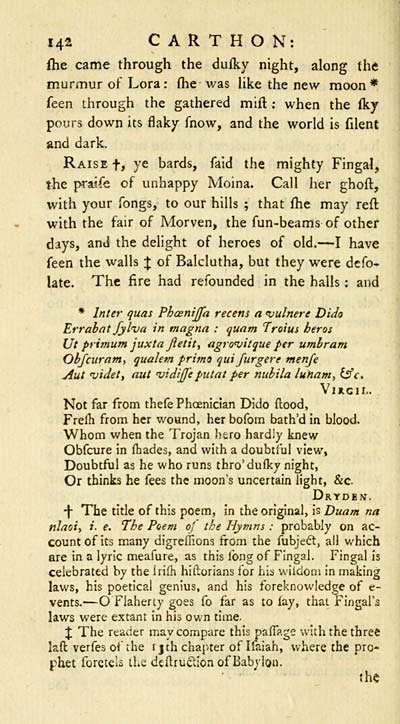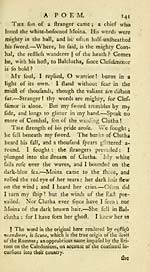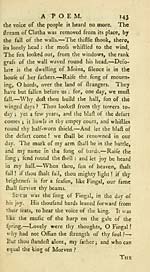Download files
Complete book:
Individual page:
Thumbnail gallery: Grid view | List view

142 C A R T H O N:
fhe came through the duiky night, along the
murmur oF Lora: fhe was like the new moon*
feen through the gathered mift : when the Iky
pours down its flaky fnow, and the world is filent
and dark.
Raise t, ye bards, fald the mighty Fingal,
the praife of unhappy Moina. Call her ghoft,
with your Tongs, to our hills ; that fhe may reft
with the fair of Morven, the fun-beams of other
days, anti the delight of heroes of old. — I have
feen the walls % of Balclutha, but they were dcfo-
late. The fire had refounded in the halls : and
* Inter quas Phcsnijfa recetts a njulnere Dido
Errahat fyl'va in magna : quant Troius heros
Ut primum juxta Jhtitj agronjitque per umbram
Obfcuram, qualetn prima qui f urge re menfe
Aut videtf aut njidijje putat per nubila luham, i^c*
VlJlClL.
Not far from thefe Phoenician Dido flood,
Frelh from her wound, her bofom bath'd in blood.
Whom when the Trojan ])£ro hardly knew
Obfcure in fhades, and with a doubtful view,
Doubtful as he who runs thro' duiky night,
Or thinks he fees the moon's uncertain light, &c.
Dryden.
-f- The title of this poem, in the original, is Duam na
ftlaoi, i. e. The Poem oj the Hymns : probably on ac-
count of its many digrefiions from the fubjedt, all which
are in a lyric meafure, as this fong of Fingal. Finga! is
celebrated by the irilh hiilorians for his wildoni in making
laws, his poetical genius, and his foreknowledge of e-
vents. — O Flaherty goes fo far as to lay, that Fingal's
laws were extant in his own time.
% The reader may compare this pafTage with the three
lafl verfes of the r jth chaj)ter of Ifaiah, where the pro-
phet foretels iLe dcflruclion of Babylon.
the
fhe came through the duiky night, along the
murmur oF Lora: fhe was like the new moon*
feen through the gathered mift : when the Iky
pours down its flaky fnow, and the world is filent
and dark.
Raise t, ye bards, fald the mighty Fingal,
the praife of unhappy Moina. Call her ghoft,
with your Tongs, to our hills ; that fhe may reft
with the fair of Morven, the fun-beams of other
days, anti the delight of heroes of old. — I have
feen the walls % of Balclutha, but they were dcfo-
late. The fire had refounded in the halls : and
* Inter quas Phcsnijfa recetts a njulnere Dido
Errahat fyl'va in magna : quant Troius heros
Ut primum juxta Jhtitj agronjitque per umbram
Obfcuram, qualetn prima qui f urge re menfe
Aut videtf aut njidijje putat per nubila luham, i^c*
VlJlClL.
Not far from thefe Phoenician Dido flood,
Frelh from her wound, her bofom bath'd in blood.
Whom when the Trojan ])£ro hardly knew
Obfcure in fhades, and with a doubtful view,
Doubtful as he who runs thro' duiky night,
Or thinks he fees the moon's uncertain light, &c.
Dryden.
-f- The title of this poem, in the original, is Duam na
ftlaoi, i. e. The Poem oj the Hymns : probably on ac-
count of its many digrefiions from the fubjedt, all which
are in a lyric meafure, as this fong of Fingal. Finga! is
celebrated by the irilh hiilorians for his wildoni in making
laws, his poetical genius, and his foreknowledge of e-
vents. — O Flaherty goes fo far as to lay, that Fingal's
laws were extant in his own time.
% The reader may compare this pafTage with the three
lafl verfes of the r jth chaj)ter of Ifaiah, where the pro-
phet foretels iLe dcflruclion of Babylon.
the
Set display mode to: Large image | Transcription
Images and transcriptions on this page, including medium image downloads, may be used under the Creative Commons Attribution 4.0 International Licence unless otherwise stated. ![]()
| Early Gaelic Book Collections > Ossian Collection > Fingal, an ancient epic poem > (180) |
|---|
| Permanent URL | https://digital.nls.uk/77449245 |
|---|
| Description | Selected books from the Ossian Collection of 327 volumes, originally assembled by J. Norman Methven of Perth. Different editions and translations of James MacPherson's epic poem 'Ossian', some with a map of the 'Kingdom of Connor'. Also secondary material relating to Ossianic poetry and the Ossian controversy. |
|---|
| Description | Selected items from five 'Special and Named Printed Collections'. Includes books in Gaelic and other Celtic languages, works about the Gaels, their languages, literature, culture and history. |
|---|

